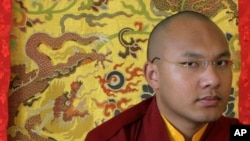A senior Chinese official has stepped forward to quash suspicions the Tibetan Buddhist leader known as the Karmapa Lama may be an agent of Beijing. Indian police have been interrogating the Karmapa Lama after finding large amounts of cash on his property.
In a remark widely quoted by Indian media Monday, Chinese Communist Party official Xu Zhitao dismissed what he called "speculation by India's media, regarding the matter of the Karmapa [Lama] as a Chinese agent or spy." He says India's reporting on an investigation into the Tibetan monk's affairs are a sign, in his words, that India harbors a "mistrustful attitude toward China."
Last week, Indian police said they found nearly a million dollars in dozens of currencies, including Chinese Yuan, at monasteries and other locations connected to the Karmapa. They have taken several of his aides into custody.
Indian media quoted the Dalai Lama, who was in Bangalore, as calling for a thorough investigation. The Tibetan Buddhist leader was quoted as saying "there has been some negligence." He also says it would be perfectly natural for the Karmapa Lama to receive cash donations from his supporters in many different countries.
Sujit Dutta, a scholar at Delhi's Nelson Mandela Center for Peace and Conflict Resolution, says it is far too early to speculate on the outcome of the investigation. But he says both India and China will watch the case closely to see if any charges develop.
"It will have diplomatic implications for India-China relations," says Dutta. "It will only add another problem to the already difficult set of issues the two countries face."
The Karmapa Lama left China in 1999 to join the Tibetan exile community in the northern city of Dharamsala. He is widely seen as the third-highest ranking monk in the Tibetan exile hierarchy, two places behind the community's spiritual and political leader, the Dalai Lama. The 25-year old monk's name is frequently raised in discussions of a successor to the 75-year-old Dalai Lama.
China says Tibet is an integral part of its territory and claims an entire Indian state, referring to it as "southern Tibet." It views the Dalai Lama as a separatist leader. India's hosting of the Dalai Lama and his followers is one of the most sensitive issues in its relationship with Beijing.
China Denies Spy Rumors Amid Probe of Tibetan Spiritual Figure

Karmapa Lama under suspicion after large amount of cash is discovered on his property in India



